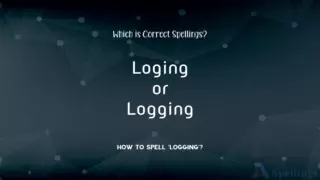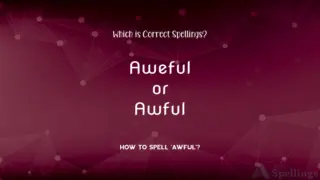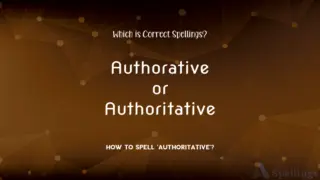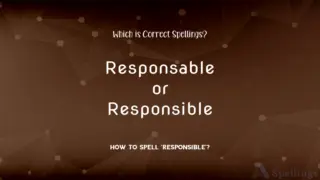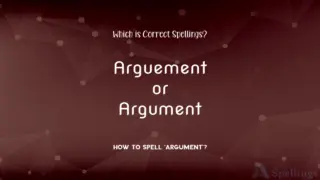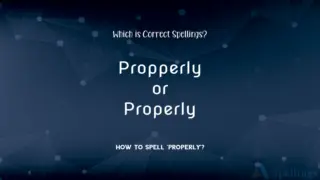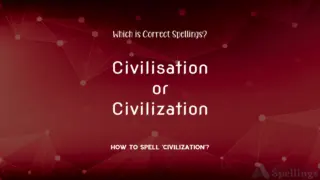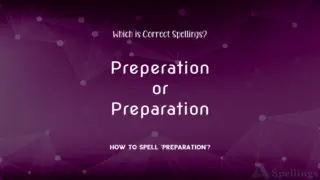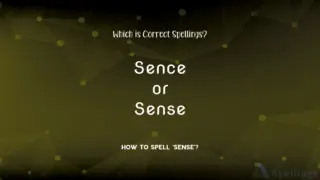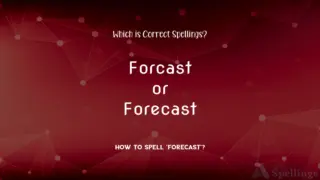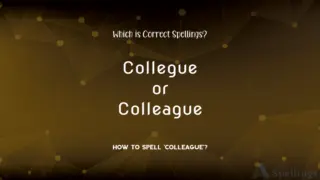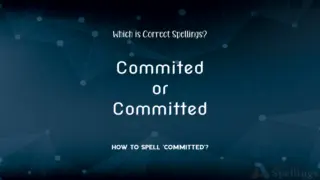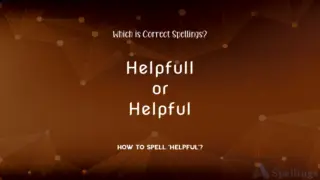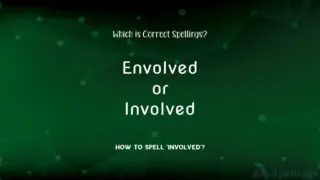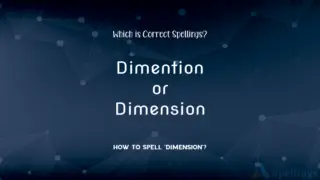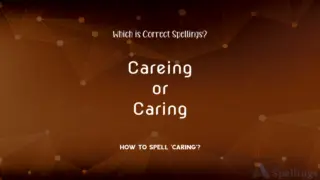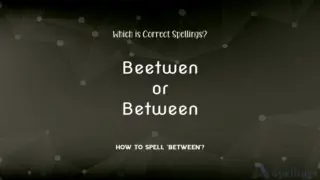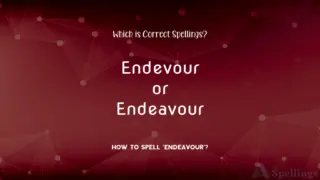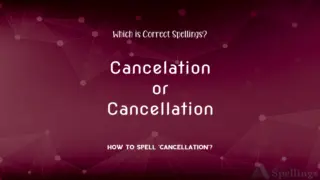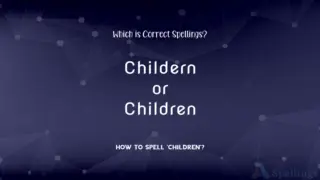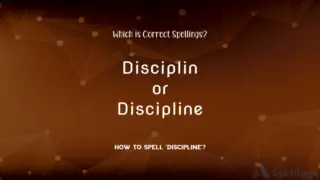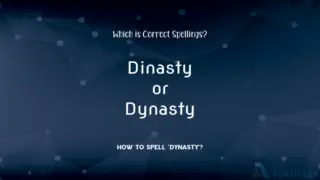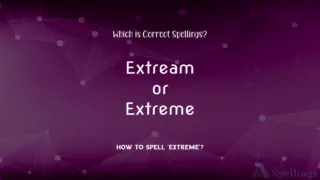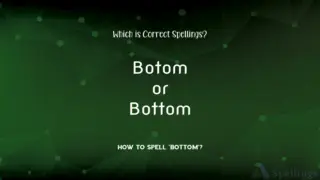Ment or Meant: Which is Correct Spellings?
The incorrect spelling is "ment," while the correct spelling is "meant." "Meant" is the past tense of "mean," used to indicate intention or purpose.
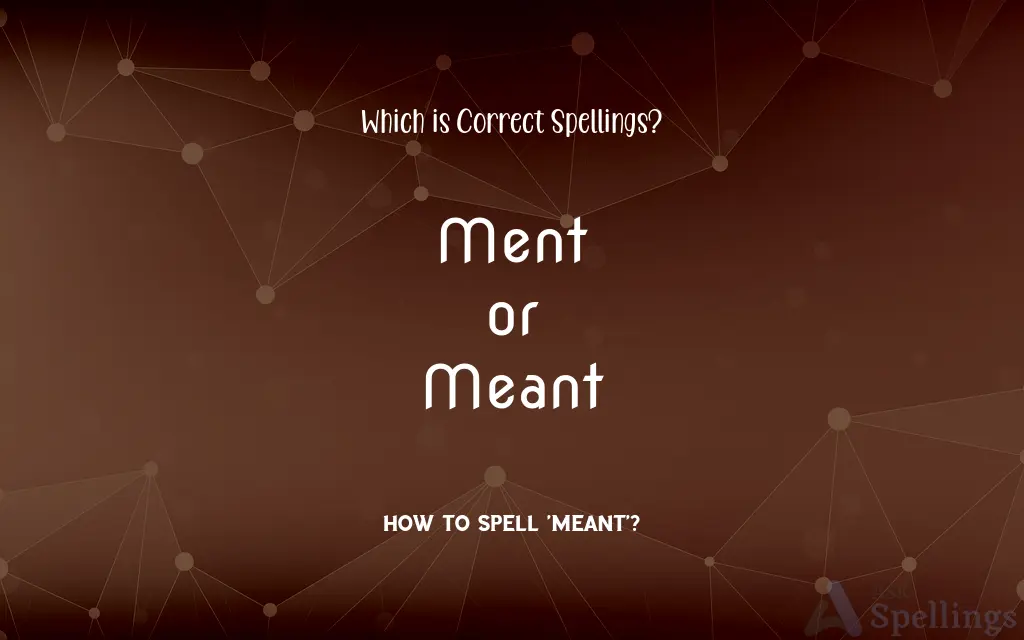
Which is correct: Ment or Meant
How to spell Meant?

Ment
Ment Spelling

Meant
Meant Spelling
Table of Contents
Is it Ment or Meant
Recall that "meant" contains "ea" like "lean," indicating past tense.
Remember, "meant" is a past tense verb, different from the suffix "-ment."
Connect "meant" with "mean," as in the base form of the verb.
Associate "meant" with "lean," both having similar vowel sounds.
Think of "ment" as a misspelling, lacking the 'a' found in "meant."
How Do You Spell Meant Correctly?
Incorrect: He ment to finish the project on time.
Correct: He meant to finish the project on time.
Incorrect: She ment no harm with her words.
Correct: She meant no harm with her words.
Incorrect: They ment it as a compliment.
Correct: They meant it as a compliment.
Incorrect: I ment to call you yesterday.
Correct: I meant to call you yesterday.
Incorrect: What exactly ment by that statement?
Correct: What exactly meant by that statement?
Meant Definitions
Past tense of 'mean,' indicating purpose.
The gift meant a lot to her.
Implied or suggested.
His smile meant he was happy.
Used to signify importance or significance.
The award meant that her work was recognized.
Intended or had in mind.
She meant to arrive early but got delayed.
Designed or destined for a particular purpose.
The book was meant for young readers.
Meant Meaning in a Sentence
Her gesture meant the world to him.
The note she left meant she'd return soon.
He meant to apologize but forgot.
She always meant to learn to play piano.
The letter meant she was accepted into college.
Winning the race meant everything to the runner.
The gift was meant as a token of appreciation.
The teacher's advice meant a lot to the students.
His joke wasn't meant to offend anyone.
The secret code meant they should meet up.
They never meant to leave the dog outside.
Her decision wasn't meant to upset anyone.
He meant to fix the bike over the weekend.
They meant to visit the museum but it was closed.
The song meant to inspire hope.
The warning sign meant danger ahead.
The old house meant many memories to the family.
She meant to call her friend but got busy.
He meant to save the last piece for her.
Her words meant encouragement to the team.
The movie was meant for a younger audience.
They meant to stay silent during the ceremony.
His actions meant he cared deeply.
The plan meant they would leave at dawn.
The arrangement was meant to be a surprise.
His promise meant he would always be there.
The recipe was meant for beginner cooks.
The picture meant to capture their happiness.
She meant to donate the books to the library.
The poem was meant to be read aloud.
Meant Idioms & Phrases
Meant to be
Predetermined or fated to happen.
Their chance meeting felt like it was meant to be.
Meant in jest
Said or done as a joke.
His teasing comment was meant in jest, not to offend.
If it's meant to happen, it will
The idea that events will unfold naturally if they are destined to.
He was relaxed about the job interview, thinking if it's meant to happen, it will.
What's meant to be will be
A belief that fate will guide the right outcome.
She didn't worry about the outcome, believing what's meant to be will be.
Never meant to last
Not intended to be permanent or long-term.
Their partnership was successful but never meant to last.
Not meant for each other
Unsuitable for a romantic relationship together.
Despite their efforts, they realized they were not meant for each other.
Clearly meant
Obviously intended or meant.
The message in his novel was clearly meant to spark thought.
Meant in good faith
Done with honest intentions.
His offer to help was meant in good faith.
Meant for greater things
Destined for success or important achievements.
Even as a young artist, it was clear she was meant for greater things.
Well-meant advice
Advice given with good intentions.
Her words were well-meant advice, though not easy to hear.
Not meant lightly
Said or done with seriousness or significant thought.
His decision to resign was not meant lightly.
Ill-meant
Having bad intentions or malice.
The ill-meant rumors caused unnecessary trouble in the community.
A sign it's meant to be
An indication that something is fated or right.
The unexpected job offer felt like a sign it's meant to be.
More than it's meant to
Exceeding the intended purpose or expectation.
The simple project meant more than it's meant to for the community.
Meant for bigger things
Intended or destined for more important roles or achievements.
She felt she was meant for bigger things than her current job.
Meant as a challenge
Intended to provoke effort or competition.
The difficult assignment was meant as a challenge to the students.
Not what it's meant to be
Not conforming to expectations or purposes.
The festival was fun but not what it's meant to be due to the heavy rain.
Meant to be a secret
Intended to remain confidential.
The plan was meant to be a secret until the launch date.
Meant as a compliment
Intended to be taken as praise or flattery.
His remark about her bold fashion choice was meant as a compliment.
Said what he meant
Spoke honestly and directly.
He always said what he meant, even in tough situations.
Common Curiosities
How do we divide meant into syllables?
Since meant has only one syllable, it is not divided.
What is the verb form of meant?
The verb form related to "meant" is "mean."
How many syllables are in meant?
Meant has one syllable.
What is a stressed syllable in meant?
The entire word "meant" is the stressed syllable.
What is the root word of meant?
The root word of "meant" is "mean" from the Old English "mænan."
Is meant an adverb?
No, "meant" is not an adverb.
What is the pronunciation of meant?
Meant is pronounced as /ment/.
Which vowel is used before meant?
The vowel used before "meant" depends on the context and the preceding word.
Is meant an abstract noun?
No, "meant" is a verb form, not a noun.
Is meant a countable noun?
"Meant" is not a noun; it is a verb form and therefore not countable.
What part of speech is meant?
"Meant" is a verb, specifically the past and past participle form of "mean."
Why is it called meant?
It is called "meant" as the past tense and past participle form of "mean," indicating the intention or significance something had in the past.
What is the first form of meant?
The first form of the verb is "mean."
Is meant a noun or adjective?
Meant is neither a noun nor an adjective; it is the past and past participle form of the verb "mean."
Is the word “meant” a Direct object or an Indirect object?
"Meant" can be used as part of a verb phrase that can function as a direct or indirect object, e.g., "What he meant surprised her."
What is the second form of meant?
The second form (simple past) of "mean" is "meant."
How is meant used in a sentence?
Example: "She meant to call you yesterday."
Is meant a vowel or consonant?
"Meant" is a word, not a vowel or consonant. It begins with the consonant 'm'.
Is meant a collective noun?
No, "meant" is not a collective noun.
Is the meant term a metaphor?
"Meant" can be used metaphorically depending on the context.
Which determiner is used with meant?
As a verb form, "meant" does not typically require a determiner.
What is the third form of meant?
The third form (past participle) of "mean" is "meant."
Is meant a negative or positive word?
"Meant" is neutral; its connotation depends on the context in which it is used.
Is the word meant Gerund?
No, "meant" is not a gerund. It is the past and past participle form of "mean."
What is another term for meant?
Another term for "meant" could be intended or implied.
Which preposition is used with meant?
Prepositions like "to" or "for" can be used with "meant," depending on context.
Which conjunction is used with meant?
Conjunctions such as "and," "or," or "but" can be used in sentences with "meant."
Which article is used with meant?
As a verb form, "meant" does not typically use an article.
Is the word meant imperative?
"Meant" is a verb form and is not used in the imperative form.
What is the opposite of meant?
The opposite of "meant" could be misconstrued or misunderstood.
What is the singular form of meant?
"Meant" remains the same in both singular and plural forms as a verb.
What is the plural form of meant?
The plural form of "meant" is the same as the singular: "meant."
Share Your Discovery
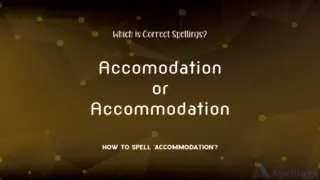
Previous Spelling
Accomodation or Accommodation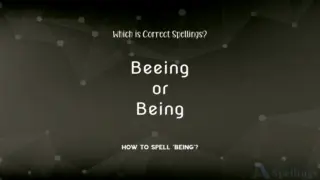
Next Spelling
Beeing or Being

